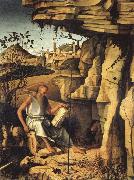Wholesale Oil Painting No Minimum |
|||||||||||
|
|
|||||||||||

|
|||||||||||
|
|
|
||||||||
Giovanni BelliniItalian High Renaissance Painter, ca.1430-1516 (b ?1431-6; d Venice, 29 Nov 1516). Painter and draughtsman, son of (1) Jacopo Bellini. Although the professional needs of his family background may have encouraged him to specialize at an early date in devotional painting, by the 1480s he had become a leading master in all types of painting practised in 15th-century Venice. Later, towards the end of his long life, he added the new genres of mythological painting and secular allegory to his repertory of subject-matter. His increasing dominance of Venetian art led to an enormous expansion of his workshop after c. 1490; and this provided the training-ground not only for his numerous shop-hands and imitators (generically known as Belliniani) but probably also for a number of major Venetian painters of the next generation. Throughout his career, Giovanni showed an extraordinary capacity for absorbing a wide range of artistic influences, both from within Venetian tradition and from outside. He also oversaw a technical revolution in the art of painting, involving the gradual abandonment of the traditional Italian use of egg tempera in favour of the technique of oil painting pioneered in the Netherlands. It was thanks to Giovanni Bellini that the Venetian school of painting was transformed during the later 15th century from one mainly of local significance to one with an international reputation. He thus set the stage for the triumphs of Venetian painting in the 16th century and for the central contribution that Venice was to make to the history of European art. |
||||||||
|
|
||||||||
St.Jerome in the Desert
St.Jerome in the Desert Painting ID:: 29801 |
mk67
Panel
45 1/4x44 1/2in
Pitti,Meridiana
mk67 Panel 45 1/4x44 1/2in Pitti,Meridiana |
|||||||
|
|
||||||||
|
CIMA da Conegliano Italian Painter, ca.1459-1517 Italian painter. He belonged to the generation between Giovanni Bellini and Giorgione and was one of the leading painters of early Renaissance Venice. His major works, several of which are signed, are almost all church altarpieces, usually depicting the Virgin and Child enthroned with saints; he also produced a large number of smaller half-length Madonnas. His autograph paintings are executed with great sensitivity and consummate craftsmanship. Fundamental to his artistic formation was the style that Bellini had evolved by the 1470s and 1480s; other important influences were Antonello da Messina and Alvise Vivarini. Although Cima was always capable of modest innovation, his style did not undergo any radical alteration during a career of some 30 years, and his response to the growing taste for Giorgionesque works from the early 16th century remained superficial. He seems to have maintained a sizeable workshop, St.Jerome in the Desert mk67 Panel 13x10 7/8in Pitti,Meridiana |
||||||||
|
|
||||||||
|
Prev Next
|
||||||||
|
|
||||||||
|
Related Paintings to CIMA da Conegliano :. |
||||||||
|
|
||||||||
|
CONTACT US |

